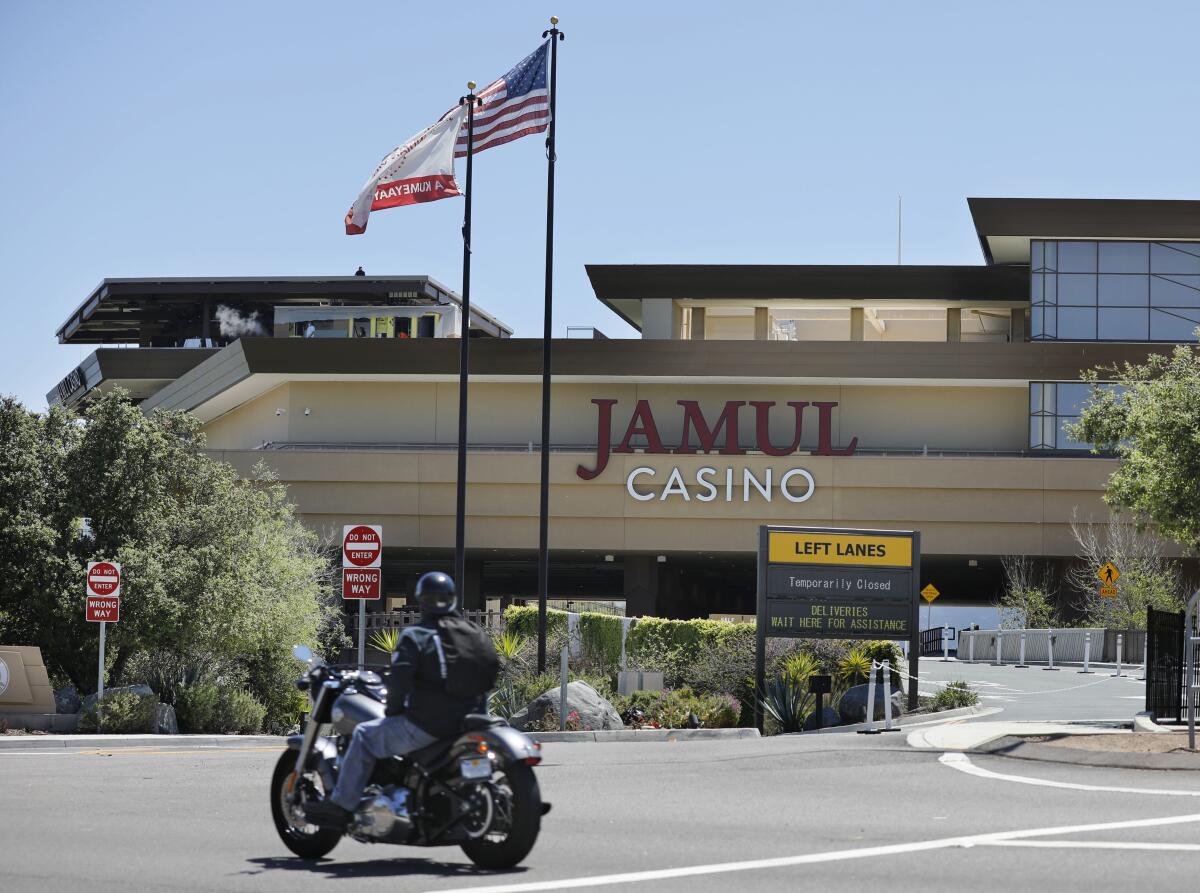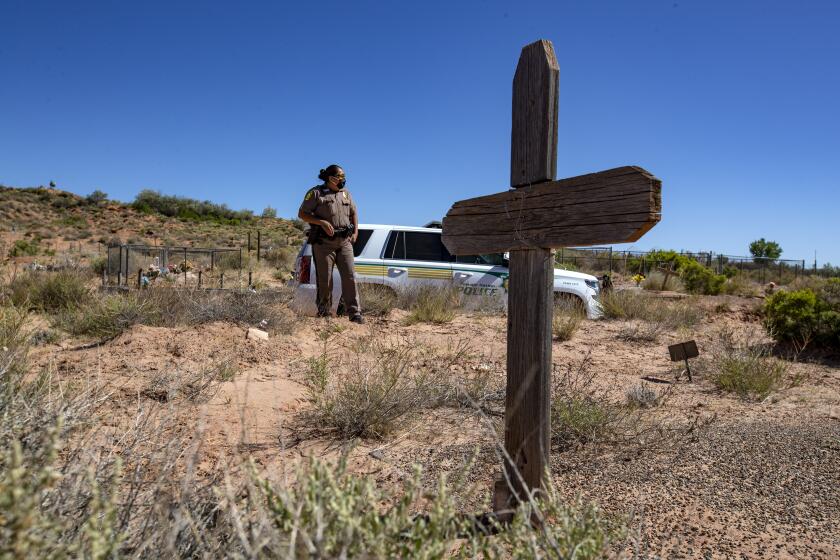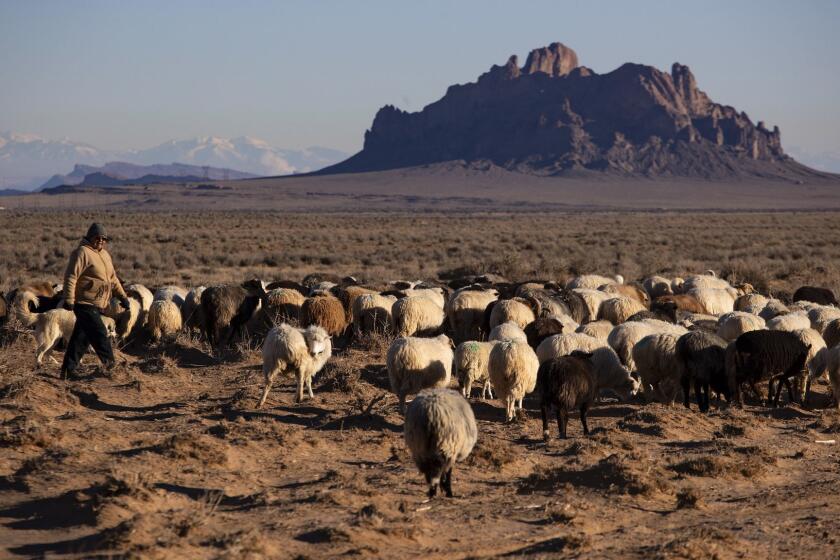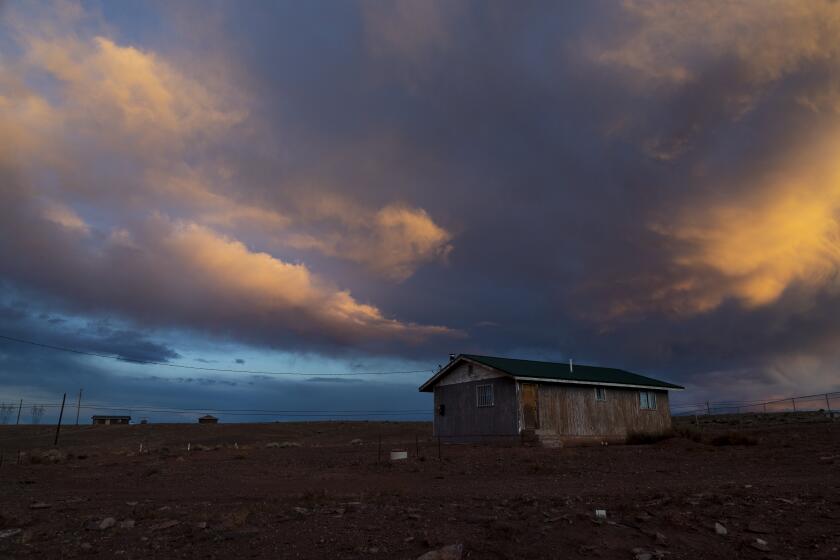Tribal lawsuit reveals San Diego County sheriff threatened to block access to reservations

- Share via
A lawsuit filed by one of San Diego County’s tribes reveals that COVID-19 was already spreading among casino employees and patrons in the early days of the pandemic and that Sheriff Bill Gore, in an effort to get casinos to close, threatened to restrict access to tribal lands.
The Aug. 6 suit was filed by the Jamul Indian Village Development Corp. — the company that operates the Jamul Casino and a branch of the Jamul Indian Village’s tribal government — against its insurance provider, Lexington Insurance Co.
While arguing that Lexington had wrongly refused to reimburse the tribe for losses it suffered during the pandemic, the tribe also shed light on how quickly COVID-19 began affecting casinos and how seriously the county responded to that potential public health threat.
According to the lawsuit, around March 12 — a day after the World Health Organization declared the novel coronavirus a pandemic — the Jamul Indian Village learned that two Jamul Casino employees and a casino patron had likely contracted COVID-19. Around that time, they also learned of an employee who had been exposed to the virus.
Nearly a week later, San Diego County imposed new public health restrictions that banned indoor dining and gatherings of 50 or more people — two regulations that directly affected casinos.
Gore sent two strongly worded letters to the tribes soon after.
Police officers on the Navajo Nation are fearing for their lives during COVID-19 pandemic. Here’s one officer’s story.
In a letter sent on March 18, Gore informed the tribes that any establishment that refused to follow the county’s new rules would be in violation of the public health order — an order the sheriff had the power to enforce.
Although casinos were in operation at the time, five tribal governments announced that day that they intended to close on March 20.
The sheriff sent a second letter to the tribes on March 19. In it, Gore said if the tribes did not comply with the order, he would be forced to “take measures to protect public safety.”
“This will, at a minimum, include restricting access to tribal lands by the general public,” the letter read. It also stated that failing to comply with the health order could impact a tribe’s ability to “obtain assistance and reimbursement for emergency protective measures such as law enforcement and other measures necessary to protect public health and safety.”
The letter stated later, “the issue of whether tribal sovereignty precludes enforcement of the public health officer’s order on tribal lands is a discussion that must be had at a later date.”
Department officials said the March 18 letter, which was shorter but similar to the March 19 letter, was actually sent out inadvertently before it was complete, and it’s unclear if every tribe received it. All tribes received the second letter.
A desperate attempt to halt coronavirus cases is underway on the country’s largest reservation, which spans Arizona, New Mexico and Utah.
The department added in a statement this week that the letters were sent at the beginning of the pandemic “when the urgency to save lives was at stake.”
California’s stay-at-home order also went into effect on March 19, and on March 20, casinos across the county closed.
Erica Pinto, chairwoman of the Jamul Indian Village Development Corp., said Gore’s letters were not part of the tribe’s decision to close its casino. Instead, the lawsuit states the decision came after the tribal council declared a reservation-wide state of emergency, which mandated that all tribal businesses, including the casino, close to the public as soon as possible.
“We do not fall under jurisdiction of the county,” Pinto said. “Our decision to close was strictly a joint effort to protect the people.”
After a two-month closure, casinos reopened, despite county health officials saying they strongly disagreed with the decision.
Upon reopening, many casinos touted additional health and safety measures designed to slow the spread of COVID-19.
Coronavirus anxiety is running high on Navajo Nation — a sprawling reservation of 175,000 residents, scarce supplies and resources, and only four inpatient hospitals. Cases are soaring, and at least two already have died.
The Sheriff’s Department said in a statement last week that they did not send any additional letters when casinos reopened in part because of the tribes’ “implementation of extensive mitigation procedures.”
However, since then, the county has not publicly released information about outbreaks that may have occurred at local casinos, deferring to the tribes who have sovereign authority.
County officials have not explained why tribal sovereignty impedes the county’s ability to report outbreaks that stem from casinos, which are identified through county-run contact tracing efforts and mostly involve San Diego County residents.
Although outbreak information remains mysterious, since the pandemic began, county officials have identified 217 San Diego County residents who stated they were at a casino in the 14 days prior to illness onset.
Of those, 76 were casino staff members and 141 were patrons. Seven casinos were named. Twelve of the individuals were hospitalized, and one person identified as a casino patron died.
Some of the 217 cases may have been contagious while at a casino, so close contacts were identified and quarantined.
County officials also noted that just because a person was at a casino during the potential exposure period doesn’t mean that they contracted the virus at that casino.
“We have repeatedly commented that going to a casino is not essential and that anyone who does so should wear a mask, wash hands, and socially distance,” said county spokesman Michael Workman. “Going to a casino would place a person at higher risk for contracting COVID compared to not attending, and those who do go are encouraged to review the precautions that the casino is taking to prevent illness.”
The Sycuan Band of the Kumeyaay Nation was the only tribe to respond to repeated requests for information about cases or outbreaks that have occurred at local casinos. Sycuan officials said that since the start of the pandemic, one casino vendor and 27 casino employees have contracted COVID-19.
Adam Day, chief administrative officer of the Sycuan Tribal Government, said the tribe identified its first coronavirus case involving an employee on March 20 — the day the casino closed. The employee told management that she started experiencing symptoms after traveling out of the country. She later tested positive.
“Since this first positive test result, we have kept detailed records of all positive cases of employees that have been traced back to Sycuan,” Day said. “This info is then communicated to our (employees) twice a week to ensure they are fully informed at all times.”
Day estimates about 1,800 employees work across the casino grounds every day and that about 10,000 people visit Sycuan Casino every day.
Unlike state, county and local governments, which can collect sales, income and property taxes, tribal governments use business operations to raise revenues. Since the 1970s, gaming operations have been the most successful and reliable government revenue stream across Indian Country, experts have said.
Although tribes receive some federal funding, successful economic developments like casinos are critical for tribal nations.
In its lawsuit, the Jamul Indian Village Development Corp. stated the casino “suffered a catastrophic loss of business income” during the closure. The tribe relies on that revenue, the lawsuit states, to support governmental programs for elders, youth, health, safety, housing, education and fire services.
Jamul Casino supports more than 1,000 permanent jobs in the region, according to the tribe.
Staff writer Karen Pearlman contributed to this report.
More to Read
Sign up for Essential California
The most important California stories and recommendations in your inbox every morning.
You may occasionally receive promotional content from the Los Angeles Times.













